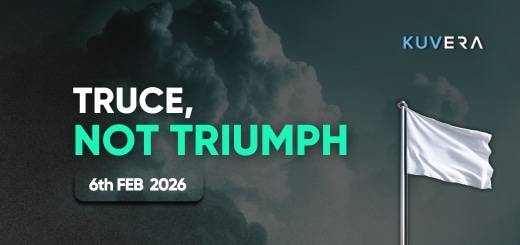In this edition, we talk about how Donald Trump’s latest tariff threats on auto and auto component imports could affect Indian companies. We also talk about the steps the Indian government is taking to avoid trade tensions with the US, the tax bill that Samsung is staring at and the fresh challenges that Amazon and Flipkart face.
Welcome to Kuvera’s weekly digest on the most critical developments related to business, finance, and the markets.
tl;dr Hear the article in brief instead?

In early March, the Boston Consulting Group came out with a study on India’s auto component industry. The study, conducted along with the Automotive Component Manufacturers Association of India (ACMA), noted how the $74-billion industry had transformed over the past few years to emerge as an important employer with a workforce of 5 million and a big foreign exchange earner. In fact, it noted that the industry even turned a trade surplus in 2023-24.
More importantly, the study recommended a roadmap to boost the country’s auto parts exports to $100 billion over the next few years from $21.2 billion in 2023-24. It also argued that the cost advantage that Mexico and Canada enjoy over India in auto and auto components exports to the US will likely erode because of the wide-ranging tariffs President Donald Trump was imposing on shipments coming from the two American neighbours.
But the study perhaps came a few days too soon. This week, Trump announced 25% tariffs on auto and auto parts imports coming into the US from all around the world.
Trump said the tariffs are aimed at boosting production in the US. But his announcement dragged down shares of automakers and auto component makers across the globe, including in India, and raised fears of job losses.
Now, India isn’t a major exporter of automobiles to the US, though a couple of companies do ship their vehicles and they will be affected. The bigger hit will be on component makers, which get a third of their export earnings from the US.
So, which companies will be affected? Among automakers Tata Motors and Eicher Motors could face the heat. Tata Motors sells its luxury vehicles Jaguar and Land Rover in the US that it ships from the UK and other overseas factories. The US accounts for a fifth of JLR’s sales. Eicher sells some of its heavy-duty Royal Enfield bikes in the US.
Several component makers will be hit, too. These include Samvardhana Motherson, Sona Comstar, and Bharat Forge, which are among India’s biggest component makers. Sona and Motherson are suppliers to companies such as Tesla and Ford, though they may be able to skirt some tariffs since they have manufacturing facilities in the US. Balkrishna Industries, Sansera Engineering, and Suprajit Engineering could also take a hit.
To be sure, the latest tariffs will affect European, Chinese, Japanese and Korean companies such as Toyota, Honda, Nissan, Hyundai, and Volkswagen. But only because they are bigger than Indian firms and export more to the US. Indian companies are unlikely to be winners in this scenario. American car buyers won’t either.
Tariff Tricks
The Indian government and companies haven’t yet figured out a response to Trump’s latest tariff threats but some other measures to ease trade tensions with the US are being put into place quickly.
Finance Minister Nirmala Sitharaman said this week the government will scrap a 6% tax on digital advertisements and remove import duty on 35 products used to make EV batteries and 28 items used in manufacturing mobile phones.
The 6% equalization levy for online advertisements required foreign companies to withhold and remit the tax to the government. Indian companies were exempt from this tax. No wonder, then, that US officials have previously criticised the tax as “discriminatory and unreasonable”. Its removal will benefit American companies such as Facebook and Instagram parent Meta, Alphabet-owned Google, and Amazon.
The second decision, the government hopes, will boost domestic production of EV batteries and smartphones and enhance export competitiveness.
Both decisions are part of changes introduced in the 2025 Finance Bill, which was passed by Lok Sabha this week. The decisions follow the entry of Elon Musk’s Tesla and Starlink into India and the ongoing talks to seal a bilateral trade deal with the US with an aim to increase two-way trade to $500 billion by 2030. Meanwhile, the government is also looking to cut tariffs on more than half of US imports worth $23 billion.
Importantly, the decisions come just days ahead of April 2, when the reciprocal tariffs that Trump has threatened to impose on all of America’s trading partners, including India, come into effect.
Will the decisions help India in convincing the US to soften its stance? We will have to wait and see.
Taxmen Come Knocking
While the government is apparently going soft on American companies to avoid trade tension with the US, it seems to be tightening the noose on other foreign companies. Earlier this year, it sent a notice to German automobile group Volkswagen seeking $1.4 billion in back taxes and penalties related to import duties. This week, news came to light that the government has ordered South Korean electronics giant Samsung and its senior executives to pay up $601 million.
Both cases are similar, and the government took several years to scrutinize the two companies before sending the demand notices in recent months. So, here’s what has happened.
The government accuses Europe’s largest automaker of misclassifying auto parts imports of some Volkswagen, Audi and Skoda cars to evade higher customs duties. Similarly, it accuses Samsung of misclassifying imports of remote radio heads, a signal transmission component used in mobile towers that it brought into India from South Korea and Vietnam for sale to Reliance Jio. While Samsung’s imports date back to 2018, VW is facing the heat for shipments going back 12 years!
Both companies have denied the allegations and are fighting legal battles with the government. The companies say the government knew of their classification practices for many years.
What happens if the two companies lose court cases? Well, Samsung is one of the biggest consumer electronics companies in India. And while the hefty fine will make a big dent, it is still less than its annual profits and the company will survive. It may even recover quickly given its leadership position in several sectors such as smartphones and TVs.
As for VW, the automaker says the case is a “matter of life and death” for its India unit. And it’s not exaggerating. VW has been struggling in India for many years and has a tiny market share. In fact, VW had been looking to sell 50% of its stake in its India business to a local partner and had been in talks with M&M, but the discussions have stalled. If the case does eventually lead to VW’s exit from India, it will be a big loss not just for the company but also to the consumers.
Mind the Shop
Samsung and VW aren’t the only foreign companies facing regulatory scrutiny in India. Two other companies that have come into the crosshairs are online shopping companies Amazon and Walmart-owned Flipkart.
Last week, the Bureau of Indian Standards—the product testing and certification agency under the Ministry of Consumer Affairs—conducted searches at the warehouses of the two ecommerce companies in Tamil Nadu. The BIS said the companies stored and sold products that did not have the necessary standards label or carried fake labels.
This week, the BIS said it raided the companies’ Delhi warehouses and seized products such as geysers, food mixers and sports shoes that did not meet quality control norms or those that didn’t have any certification mark.
While the value of items it seized may be low—about Rs 70 lakh from the Amazon warehouse—the raids are the latest troubles for the two companies that have also been other regulatory battles. These include accusations that they violate Indian laws by giving preferential treatment to certain sellers on their marketplaces.
Both Amazon and Flipkart have previously said they adhere to all local laws. The two companies are the biggest players in India’s fast-growing ecommerce market, where local companies such as the Tatas and Reliance Retail haven’t managed to establish a dominant presence. However, Amazon and Flipkart are facing increased competition from quick-commerce companies such as Zepto, Zomato’s Blinkit, and Swiggy’s Instamart that deliver many products within 10-30 minutes.
Clearly, Amazon and Flipkart will have to manage these regulatory and competitive headaches, if they want to continue operating and protect the billions of dollars they have invested in India over the last decade.
Market Wrap
India’s stock markets recorded gains this week on bargain buying, capping a strong show in March and managing to end the financial year 2024-25 in the green.
The BSE Sensex rose 0.66% this week while the NSE Nifty did a little better and gained 0.7%. For March, the Nifty jumped 6.3% while the Sensex climbed advanced 5.1%. This helped the two benchmarks wipe out their losses and clock a 5% gain for the entire fiscal year. To be sure, the indices are still down about 10% from their record highs in late September.
The week also saw the entry of food delivery company Zomato and Jio Financial into the Nifty and the exit of state-run refiner BPCL and FMCG company Britannia. Zomato ended in the red this week while Jio Financial gained.
Financial stocks were mostly higher this week, led by Bajaj Finserv and Kotak Mahindra Bank. HDFC Bank, Axis Bank and SBI also rose. Consumer-focused companies such as Tata Consumer and Trent as well as Hero MotoCorp and PowerGrid were also among the top performers.
IndusInd Bank was the biggest loser. Automakers Tata Motors and M&M as well as drugmakers Cipla, Dr Reddy’s Labs and Sun Pharma fell on concerns related to US tariffs.
Other Headlines
- SEBI proposes to limit derivatives expiry days to Tuesdays or Thursdays
- Russian President Vladimir Putin to visit India
- Wipro wins 10-year contract worth $650 million from British insurer Phoenix Group
- Germany’s Siemens Energy sells 90% stake in Indian wind turbine unit to TPG-led consortium
- Maruti Suzuki to invest Rs 7,410 crore to set up one more plant in Haryana
- Govt partially discontinues gold monetisation scheme introduced in 2015
- RBI revises priority sector lending guidelines
- SEBI to review provisions for members’ conflict of interest
- Bank of America to appoint Vikram Sahu as new India head, replacing Kaku Nahate
- Ashok Leyland may shut loss-making electric bus factory in UK
- Maharashtra govt withdraws proposal to levy 6% sales tax on EVs
- Bharti Airtel, unit Bharti Hexacom pay Rs 5,985 crore to clear 2024 spectrum dues to govt
- Air India says all employees, including top management, will travel in Economy class from April
- British sportswear company Frasers to open more than 350 Sports Direct stores in India, Southeast Asia
That’s all for this week. Until next week, happy investing.
Interested in how we think about the markets?
Read more: Zen And The Art Of Investing
Watch here: Investing in International Markets
Start investing through a platform that brings goal planning and investing to your fingertips. Visit kuvera.in to discover Direct Plans and Fixed Deposits and start investing today. #MutualFundSahiHai #KuveraSabseSahiHai












